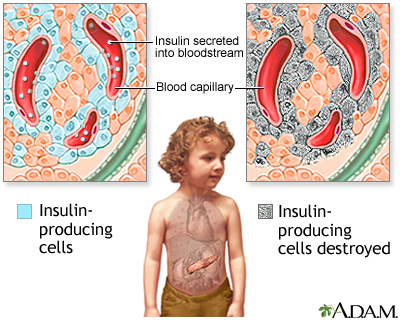
Hyperglycemia refers to a condition in which the level of blood sugar is elevated above normal levels
Hyperglycemic disorders include diabetes, hyperthyroidism and idiopathic obesity. It can also occur as a result of taking certain medications, such as birth control pills, beta-blockers, sedatives, insulin, calcium channel blockers and phenytoin, and can be hereditary.
Hyperglycemia is a technical term for elevated blood sugar (blood sugar above the normal level). Hyperglycemic disorders happen when your body cannot properly use insulin and when it has too much insulin in the system. Some causes of hyperglycemic conditions are:
If you have a form of diabetes, you can have hyperglycemic conditions as a result of the excess insulin your body produces. For instance, if you have a condition known as adult onset diabetes, your body may produce too much insulin and not be able to process the insulin it has produced. If you have a condition called juvenile onset diabetes, your body is producing too much insulin, but is still being stimulated by insulin production in the bloodstream to turn on the pancreas.
If you are a diabetic, or are at risk of becoming diabetic, you need to stay away from foods that are high in carbohydrates because these types of foods increase the insulin in your body. You also want to stay away from foods containing sugar, because these types of foods stimulate insulin production. To avoid hyperglycemic conditions, limit the amount of carbohydrates you consume.
Insulin sensitivity can also affect the amount of insulin your body produces. If you have more than normal amounts of insulin in your system, you may suffer from hyperglycemic conditions. You may experience hyperglycemic conditions in your skin and kidneys, as well.
Other serious hyperglycemic conditions include kidney disease and liver disease. You should contact your doctor if you suffer from any of these conditions because your medical history and current medications may be a sign of an underlying illness.

You may also have hyperglycemic conditions due to taking certain medications, such as beta-blockers or anticoagulants, which lower the amount of blood sugar your body produces. and may cause hyperglycemic conditions. When you take these medications, the blood sugar levels may rise temporarily, but the levels are quickly restored to their normal levels.
Diabetes is a condition where you have either too much or not enough insulin to convert the food you eat into energy. In some cases, the cells of your pancreas cannot absorb the sugar your body produces, resulting in not being able to use the energy for energy.
Diabetes is a medical condition that can affect both males and females. However, diabetes usually occurs more often in men. It is estimated that almost 1 in every 6 Americans is affected by diabetes.
There are a number of medical conditions that have been linked to hyperglycemia
You may suffer from hyperglycemia if you take medications that contain or affect the levels of calcium in your body. Drugs that have been linked to hyperglycemia include medications used for cancer, chemotherapy, high blood pressure treatment, or insulin.
People who are overweight tend to have a higher incidence of diabetes. They have also been shown to suffer from hyperglycemia due to the amount of fat they have stored in their bodies. Hyperglycemia may also occur if you are overweight.
People who are obese tend to have a higher occurrence of diabetes. They have also been shown to suffer from hyperglycemia because of the extra fats stored in their bodies, which is difficult for the pancreas to handle.
If you have not had any type of test for diabetes before, you may want to see your physician for a physical examination. In this exam, your doctor will check your glucose levels and other factors to see if there are any problems that can be corrected by testing and correcting your diet.